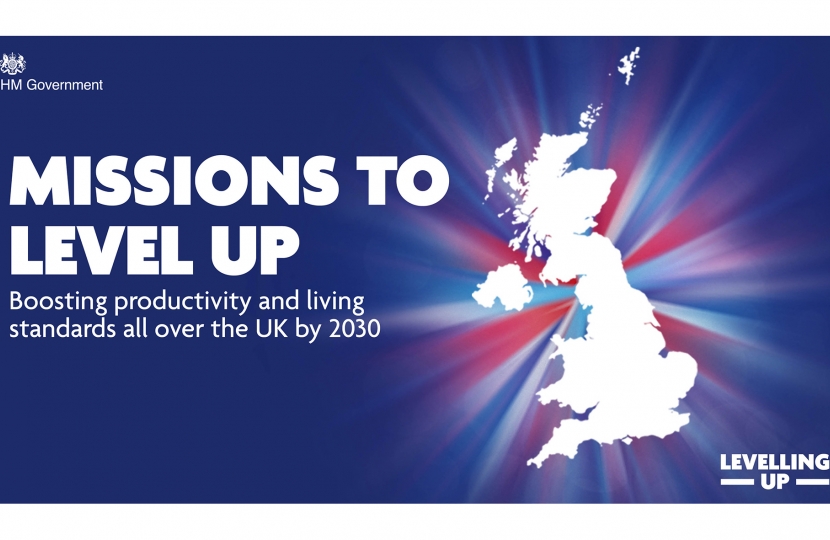While talent is spread equally across our country, opportunity is not. Levelling up is a mission to challenge, and change, that unfairness.
Levelling up means giving everyone the opportunity to fourish. It means people everywhere living longer and more fulflling lives, and beneftting from sustained rises in living standards and well-being. This requires us to end the geographical inequality which is such a striking feature of the UK.
It is vital that we preserve and enhance the economic, academic and cultural success stories of the UK’s most productive counties, towns and cities.
But it is equally critical that we improve productivity, boost economic growth, encourage innovation, create good jobs, enhance educational attainment and renovate the social and cultural fabric of those parts of the UK that have stalled and not – so far – shared equally in our nation’s success.
Norfolk has been invited to seek a 'county deal' as part of the government's levelling up white paper.
This devolution revolution will be the largest transfer of power from Whitehall to local leaders across England in modern times. By 2030, every part of England that wishes to have a ‘London-style’ devolution deal will have one.
Last year Norfolk CC submitted an expression of interest in discussing a pilot county devolution deal. While the involvement of district authorities will be encouraged, the government have confirmed that county deals will be agreed with county and unitary local authorities.
The government will drive further school improvement in Norfolk by making it one of 55 new Education Investment Areas (EIAs).
The Department for Education (DfE) will support strong multi-academy trusts to expand into places where educational attainment is currently weakest. They will offer retention payments to help schools with supply challenges in these areas to retain the best teachers in high-priority subjects.
More intensive investment will be available across some EIAs to tackle wider issues that may be limiting school improvement. The UK Government will ensure that talented children from disadvantaged backgrounds have access to a post-16 provider with a track record of progress on to leading universities by opening new 16-19 free schools targeted in areas where they are most needed, such as high priority EIAs.
Nationally, levelling up will require us to:
-
boost productivity, pay, jobs and living standards by growing the private sector, especially in those places where they are lagging;
-
spread opportunities and improve public services, especially in those places where they are weakest;
-
restore a sense of community, local pride and belonging, especially in those places where they have been lost; and
-
empower local leaders and communities, especially in those places lacking local agency.
Levelling up is not about making every part of the UK the same, or pitting one part of the country against another. Nor does it mean dampening down the success of more prosperous areas. Indeed, by extending opportunity across the UK we can relieve pressures on public services, housing and green felds in the South East. And levelling up can improve well-being in the South East by improving productivity in the North and Midlands.
So, it is about the success of the whole country: realising the potential of every place and every person across the UK, building on their unique strengths, spreading opportunities for individuals and businesses, and celebrating every single city, town and village’s culture. This will make the economy stronger, more equal and more resilient, and lengthen and improve people’s lives.
Progress
The UK Government has made progress towards spreading opportunity around the country since 2019, alongside mitigating the worst efects of the pandemic, with:
-
£5bn for Project Gigabit to bring gigabit-capable broadband to 85% of the UK by 2025, and the £1bn Shared Rural Network deal with mobile operators delivering 4G coverage to 95% of the UK by the end of 2025;
-
fve-year consolidated transport settlements amounting to £5.7bn in eight city regions outside London, £5bn of funding for buses and active travel over this Parliament; and £96bn for the Integrated Rail Plan delivering faster, more frequent and more reliable journeys across the North of England and the Midlands;
-
a new schools funding formula in England ending the previous postcode lottery, and an extra £4bn for schools in England next year, rising to £4.7bn in 2024-25
-
investment of £3.8bn in skills planned by 2024-25 and a Lifetime Skills Guarantee in England, enabling 11m adults to gain an A Level or equivalent qualifcation for free, as well as a new UK-wide adult numeracy programme and skills bootcamps;
-
£23.3bn extra for the NHS in England over the 2021 Spending Review (SR21) period, a commitment to build 40 new hospitals by 2030 and an ambition to deliver 50,000 more nurses;
-
a lower Universal Credit taper rate – down from 63% to 55% – and a higher National Living Wage, making work pay for millions of people, and letting them keep more of what they earn;
-
20,000 more police ofcers on our streets by 2023 and a £70m Safer Streets Fund to improve the environment and cut ofending in high-crime areas;
-
control of our immigration system by ending free movement and introducing a new points-based immigration system, giving the UK the freedom to decide who comes to our country based on the skills people have to ofer;
-
£1.49bn in City and Growth Deals in every part of Scotland, £791m across Wales and £617m for deals covering the whole of Northern Ireland;
-
eight innovative Freeports bringing jobs, investment and prosperity across England with a commitment to deliver more Freeports in each of Scotland, Wales and Northern Ireland;
-
101 towns across England receiving £2.4bn from the Towns Fund to unleash their economic potential, and the £830m Future High Streets Fund regenerating 72 towns and high streets and helping them recover from the pandemic;
-
a £2bn Culture Recovery Fund helping museums, theatres, cinemas and heritage organisations survive the pandemic;
-
£4.8bn infrastructure investment in towns across the UK via the Levelling Up Fund;
-
a £150m Community Ownership Fund, giving people across the UK the chance to become owners of their local pubs or football grounds;
-
£26bn of public capital investment for the green industrial revolution and transition to Net Zero; and
-
the movement of UK Government functions and civil servants out of Whitehall, ensuring levelling up is not directed from London, creating local jobs and taking decision-making closer to the communities the Government serves, including HM Treasury to Darlington, the Cabinet Ofce to Glasgow, the Foreign, Commonwealth and Development Ofce (FCDO) to East Kilbride and the Department for Levelling Up, Housing and Communities (DLUHC) to Wolverhampton.




